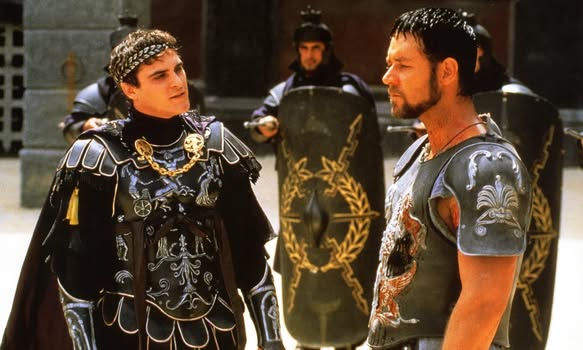Gladiator (2000)

Gladiator (2000) is an epic historical drama that has left an indelible mark on the cinematic landscape. Directed by Ridley Scott, the film combines stunning visuals, a gripping narrative, and powerful performances to create a remarkable portrayal of vengeance, honor, and the quest for redemption. With its grand scale and emotional depth, Gladiator not only revitalized the sword-and-sandal genre but also earned critical acclaim, including five Academy Awards, solidifying its status as a modern classic.
Set in ancient Rome, the film follows the journey of Maximus Decimus Meridius, played masterfully by Russell Crowe. Once a respected general in the Roman army, Maximus is betrayed and reduced to slavery after the death of Emperor Marcus Aurelius. As he rises through the ranks of the gladiatorial arena, he seeks vengeance against the power-hungry Commodus, portrayed with chilling intensity by Joaquin Phoenix. The film explores themes of loyalty, betrayal, and the struggle for power, all while portraying the brutality and grandeur of Roman society.

The narrative unfolds with a blend of action and drama, showcasing intense battle sequences and emotionally charged moments. The film’s cinematography, helmed by John Mathieson, captures the sweeping landscapes of ancient Rome and the visceral intensity of the gladiatorial games. The use of practical effects and detailed set designs immerses viewers in a world that feels both authentic and grandiose.

Scott’s direction is complemented by a haunting score from Hans Zimmer, which elevates the emotional stakes and enhances the film’s epic quality. The music underscores Maximus’s internal struggles and triumphs, creating an atmosphere that resonates deeply with the audience. The film’s pacing balances intense action with quieter, introspective moments, allowing for character development and emotional engagement.
Gladiator also features a strong supporting cast, including Connie Nielsen as Lucilla and Oliver Reed as Proximo. Their performances enrich the narrative and add complexity to the central themes of loyalty and power dynamics within the Roman Empire.

In summary, Gladiator is a masterful blend of action, drama, and historical narrative that captivates audiences with its emotional depth and visual grandeur. Ridley Scott’s direction, combined with powerful performances and a haunting score, creates a timeless story of revenge and redemption. The film not only entertains but also prompts reflections on honor and the human spirit’s resilience, making it a significant achievement in the realm of modern cinema. Its impact continues to resonate, inspiring a new generation of filmmakers and viewers alike.











